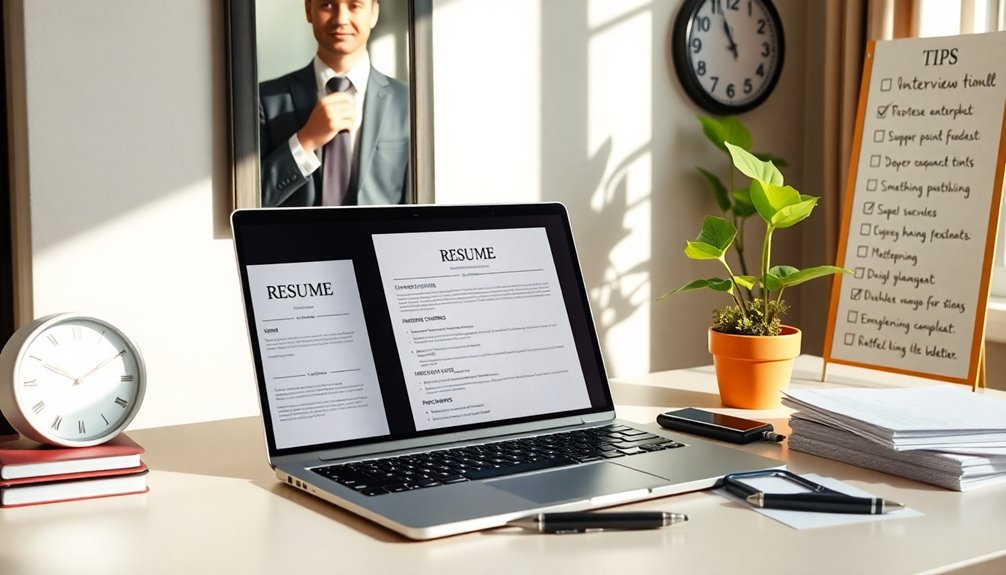To prep for a job interview, start with self-assessment. Identify your strengths and relevant experiences, using the STAR method to structure your answers. Research the company's mission and culture to align your responses. Practice your communication skills and develop a 30-second elevator pitch. Engage in mock interviews to boost your confidence and manage anxiety. Prepare thoughtful questions to ask the interviewer. After the interview, don't forget to follow up with a thank-you email. Each step enhances your chances of success. Keep going, and you'll discover even more valuable tips for your job interview preparation!
Key Takeaways
- Conduct a self-assessment to identify your strengths and relevant achievements that align with the job description.
- Research the company's mission, values, and recent projects to tailor your responses and show genuine interest.
- Prepare and practice a concise elevator pitch that highlights your background and key qualifications for the role.
- Engage in mock interviews to build confidence and receive feedback on your communication skills and presentation.
- Develop insightful questions to ask the interviewer, showcasing your enthusiasm and understanding of the position.
Self-Assessment and Strengths

To ace your job interview, starting with a thorough self-assessment is essential. Take the time to identify your unique skills and strengths that align with the job requirements. Reflect on your past experience; pinpoint key achievements that showcase your capabilities and demonstrate your fit for the desired position. This reflection will help you articulate your value during the interview.
Engaging in feedback sessions with peers or mentors can provide valuable insights into your strengths and areas for improvement. These discussions enhance your self-awareness and can reveal skills you might overlook. Additionally, utilize self-reflection exercises to clarify your motivations and professional goals. Confirm that your reasons for wanting the job align with your personal values, as this authenticity can resonate with interviewers.
Prepare a concise summary of your strengths tailored to the specific job role. This summary will serve as a foundation for your responses to common interview questions, allowing you to speak confidently and clearly about what you bring to the table. Remember, the more prepared you are, the better you'll connect your past experiences to the position you're pursuing.
Research the Company
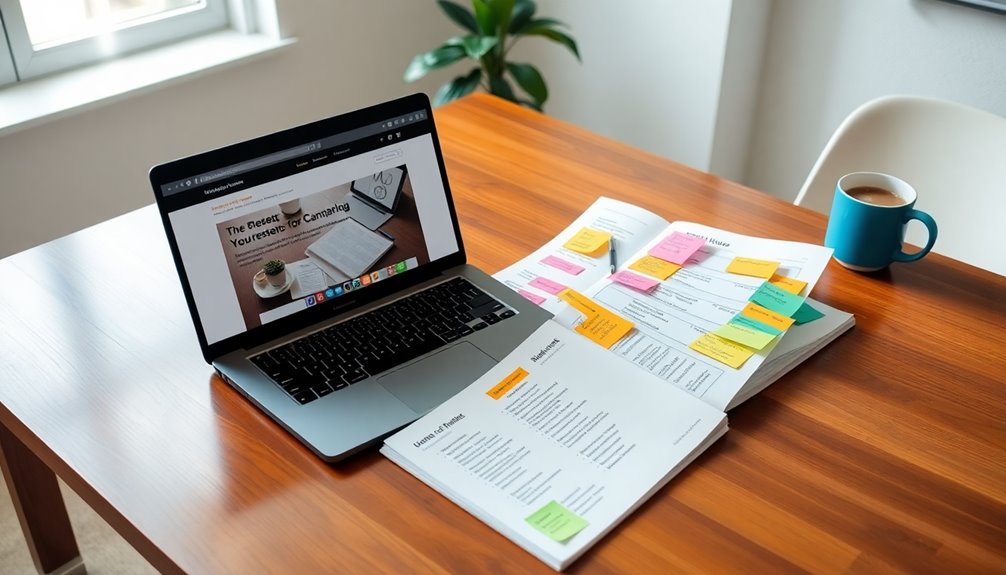
How well do you know the company you're interviewing with? Researching the organization is essential for your success. Start by investigating its mission, values, and vision through the official website and annual reports. This'll help you understand their core principles and strategic direction.
Next, analyze recent news articles, press releases, and social media posts to stay updated on their latest projects and achievements. This insight will allow you to engage in meaningful conversations during your interview.
Don't forget to explore platforms like LinkedIn. Check out employee profiles to gather insights into the company culture, team dynamics, and possible career paths. Understanding the company's environment can help you determine if it's the right fit for you.
It's also important to identify the company's main competitors. Understanding their market positioning will give you a clearer view of the industry landscape and the problems the organization faces. Finally, review employee feedback on sites like Glassdoor to learn about work-life balance and management styles. This thorough research will equip you with the knowledge you need to impress during your interview.
Understand Employer Challenges
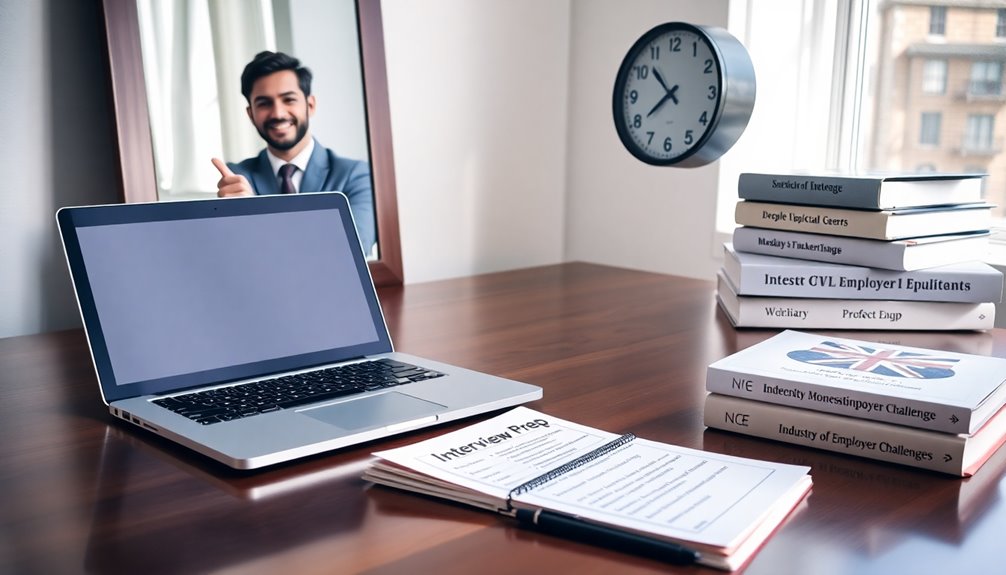
To stand out in your interview, you need to understand the specific challenges the company faces. Look closely at the job description to identify potential pain points and think about how your skills can address them. By showing that you grasp these issues, you'll position yourself as a solution-oriented candidate. Additionally, consider building support networks to enhance your understanding of industry trends and challenges.
Identify Company Pain Points
Understanding an employer's challenges is essential for making a strong impression during your job interview. To identify company pain points, start by researching recent projects and news articles. This can help you uncover specific challenges the company may be facing within its industry. Next, analyze the job description for emphasized skills and experiences; these often indicate areas where the company might need support.
Additionally, checking employee feedback on platforms like Glassdoor can provide insight into common concerns within the organization. Pay attention to recurring themes, as these might reveal significant pain points. Understanding the competitive landscape is also vital. Identify key competitors and their strengths, as this can highlight where the company struggles to differentiate itself.
Once you've gathered this information, prepare to discuss how your skills and experiences can directly address these challenges. By positioning yourself as a valuable solution to the employer's pain points, you can demonstrate your understanding of their needs and show how you can contribute meaningfully. This proactive approach not only enhances your credibility but also sets you apart as a candidate who genuinely cares about the company's success. Additionally, showcasing your problem-solving abilities can further illustrate your potential to navigate these challenges effectively.
Analyze Job Description Issues
When you analyze a job description, pinpointing key responsibilities and potential challenges becomes essential for tailoring your interview responses. Start by identifying the specific responsibilities outlined in the job description. This will help you understand what skills and experiences you need to highlight during the interview.
Next, do your research on the company's current challenges, such as market competition or operational inefficiencies. Recognizing these issues will enable you to demonstrate how the role contributes to overcoming them. Frame your background as a solution by linking your experiences to the skills required in the job description.
During the interview, engage in conversations about the identified challenges. This showcases your ability to think critically and positions you as a proactive candidate. For instance, if the job involves enhancing customer service, share relevant examples from your past experiences that illustrate your capability to improve customer satisfaction.
Prepare Relevant Experience
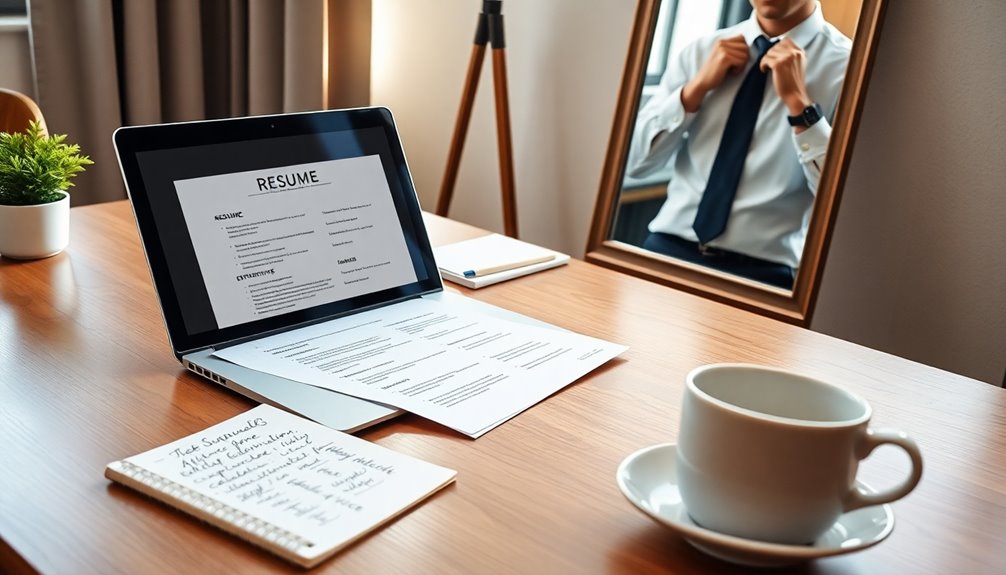
To stand out in your interview, highlight key achievements that align with the job description. Use the STAR method to structure your responses, making your experiences clear and compelling. Also, tailor your examples to reflect the company's culture and values, showcasing how you can meet their specific needs.
Highlight Key Achievements
Highlighting your key achievements can greatly enhance your interview performance, as it showcases your relevant experience and value to potential employers. Start by identifying your top three achievements that align with the job you're applying for. Each achievement should demonstrate your skills and contributions effectively.
When discussing these achievements, think about the situation you faced, the action you took, and the result you achieved. This structure helps provide clear context and showcases the impact of your actions on the organization or project. For added credibility, quantify your achievements where possible—mention percentage improvements, revenue generated, or time saved.
Tailor your highlighted achievements to match the specific skills and qualifications outlined in the job description. This guarantees that your examples resonate with the employer's needs. Practicing your delivery is vital; aim to present your key achievements succinctly to maintain engagement during the interview. Be clear and confident in your responses, allowing your accomplishments to shine through. By preparing in this way, you'll demonstrate not just what you've done, but how you can bring value to the role you're seeking.
Use STAR Method
Preparing to articulate your relevant experiences effectively can set you apart in a job interview. One of the best ways to do this is by using the STAR method, which stands for Situation, Task, Action, and Result. This structured approach helps you convey your skills and the positive impact of your actions clearly.
Here's a simple breakdown of the STAR method:
| Component | Description |
|---|---|
| Situation | Describe the context of your experience. |
| Task | Explain the specific tasks you were assigned. |
| Action | Detail the actions you took and the skills used. |
| Result | Highlight the outcomes and positive impacts. |
When you prepare, start by outlining a relevant situation and the task at hand. Then, focus on the actions you took, emphasizing your role in the process. Finally, wrap up with the result, showcasing quantifiable achievements or valuable lessons learned. Practicing the STAR method with various examples will enhance your fluency and confidence, making you ready to discuss your experiences effectively in any job interview. Additionally, developing healthy boundaries can help you present yourself authentically during the interview process.
Tailor Examples to Role
Tailoring your examples to the specific role you're applying for is essential for making a strong impression during your interview. Start by reviewing the job description carefully to identify the key skills and experiences required. This allows you to tailor your examples effectively to align with the responsibilities and challenges of the position.
Utilize the STAR method to structure your responses: describe the Situation and Task, then outline the Action you took and the Result achieved. Prepare at least three specific examples from your past experiences that highlight your problem-solving abilities and relevant skills. For instance, if the role emphasizes teamwork, share an example where collaboration led to a successful outcome.
Practice articulating these examples concisely, aiming for responses that last 30-45 seconds to keep the interviewer's attention. Be ready for follow-up questions related to your examples, and prepare to elaborate on your contributions and decision-making processes. By effectively tailoring your examples, you'll demonstrate not only your qualifications but also your genuine interest in the role, making you a memorable candidate during the interview.
Master Communication Skills

During your job interview, mastering communication skills is essential for making a strong impression. Start by maintaining a straight posture and courteous demeanor; this conveys confidence and professionalism. Your body language speaks volumes, so use a confident tone and a warm smile to enhance rapport with your interviewer. Research shows that positive body language can greatly impact how you're perceived.
Make eye contact to establish a connection. Studies indicate that maintaining eye contact leads to more engaging and productive conversations. It shows you're attentive and invested in the dialogue. Prepare a concise 30-second elevator pitch summarizing your background and experience. This allows you to articulate your value effectively and sets a positive tone for the interview.
Additionally, practice active listening. Focus on the interviewer's questions without interruptions; this fosters a respectful dialogue and demonstrates your engagement. By mastering these communication skills, you not only convey your qualifications but also create an inviting atmosphere that encourages open conversation. Remember, the way you communicate matters just as much as what you say. Recognizing signs of stagnation in communication can help you adapt and improve your interactions during the interview process.
Dress for Success

When it comes to dressing for an interview, choosing professional attire is key to making a great first impression. You'll want to research the company's dress code to guarantee your outfit aligns with their culture. Don't forget that personal grooming and hygiene play a vital role in showcasing your professionalism.
Professional Attire Selection
Your choice of professional attire can greatly impact the impression you make during a job interview. Start by researching the company's dress code; aim to dress slightly more formally than their typical workplace attire. This shows respect for their culture and an understanding of professional norms.
Choose clothing that's clean, pressed, and well-fitted to project confidence and professionalism. Avoid anything overly casual or flashy; conservative dressing is key. A well-chosen outfit can help you stand out positively in a sea of candidates.
When selecting your attire, consider the overall impact of accessories and footwear. Make sure they complement your professional image without drawing too much attention. Subtlety can be your ally here.
Grooming and Personal Hygiene
Grooming and personal hygiene play an essential role in making a positive impression during a job interview. When you present a polished, professional appearance, you not only boost your confidence but also demonstrate respect for the interviewers and the opportunity at hand. Remember, first impressions are formed within seconds, and a well-groomed appearance can greatly impact how you're perceived.
To guarantee you meet expectations, focus on the following grooming tips:
- Maintain clean hair and nails: A neat hairstyle and tidy nails show attention to detail.
- Wear minimal, appropriate makeup or accessories: Less is often more in a professional setting, keeping your look polished yet understated.
- Choose clean, pressed, and well-fitted attire: This reflects a commitment to professionalism and aligns with the organization's culture.
Dressing appropriately and guaranteeing proper personal hygiene not only reflects your competence but also your understanding of workplace norms. By prioritizing grooming, you set a strong foundation for your interview success.
Company Dress Code Awareness
Understanding a company's dress code can greatly influence your interview success. Researching the company's dress code standards is crucial. Check their website or observe employee attire to guarantee your outfit aligns with their culture. Dressing slightly more formal than the workplace norm creates a positive first impression and signals professionalism to interviewers.
Here's a quick guide to help you decide on your attire:
| Dress Code Type | Appropriate Attire | Example Roles |
|---|---|---|
| Business Formal | Suit, dress shirt, tie | Corporate, Law |
| Business Casual | Slacks, blouse, blazer | Tech, Marketing |
| Casual | Neat jeans, polo shirt | Startups, Creative |
Aim for clean, pressed, and well-fitted clothing, as well-groomed attire considerably contributes to perceived competence and respect for the interview process. When in doubt, opt for conservative clothing choices, as they're generally safer and more universally accepted. Always consider the specific role you're interviewing for, as different positions may have varying expectations for attire.
Manage Interview Anxiety
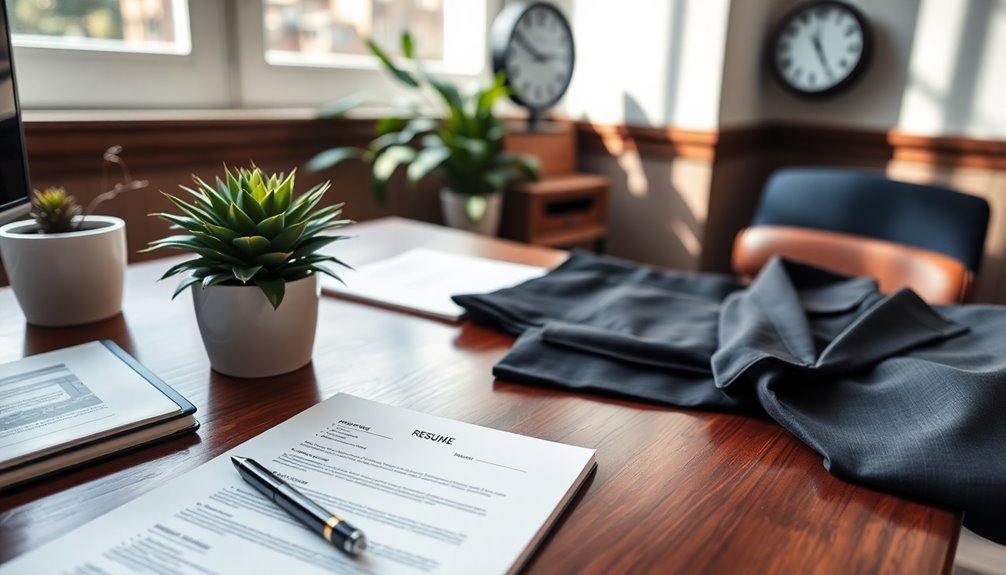
Interview anxiety can feel overwhelming, but with the right strategies, you can take control and ease those nerves. Start by preparing thoroughly; research the company and the role to boost your confidence. The more familiar you are, the less anxious you'll feel. Practicing relaxation techniques, such as deep breathing or visualization, can also help calm your mind before stepping into the interview room.
Here are a few more tips to manage your anxiety:
- Engage in mock interviews with friends or career coaches to simulate the experience and build confidence.
- Maintain a positive mindset by reminding yourself of your qualifications and past achievements.
- Arrive early to the interview location, allowing yourself time to relax and engage in mental preparation.
Develop Enthusiasm and Engagement

Bringing enthusiasm to your job interview can make a significant difference in how interviewers perceive you. When you show genuine excitement about the role, your potential contributions to the team, and the organization, it resonates with interviewers and sets a positive tone. Use positive body language—maintain eye contact and adopt an open posture—to convey engagement and create a friendly atmosphere.
Active listening is essential. Focus intently on the interviewer's questions and respond thoughtfully, which helps build rapport and shows respect for their insights. Incorporate knowledge of the organization's recent projects or developments into your conversation. This not only demonstrates your understanding of the company but also shows your engagement and commitment.
Lastly, be prepared to ask thoughtful questions about the company culture and team dynamics. This reflects your curiosity and genuine interest in becoming part of the organization. By embodying enthusiasm and engagement, you not only enhance your chances of making a lasting impression but also position yourself as a candidate who truly values the opportunity to contribute to the team's success. Additionally, demonstrating your understanding of Cultural Intelligence can further showcase your ability to navigate diverse work environments effectively.
Prepare Thoughtful Questions
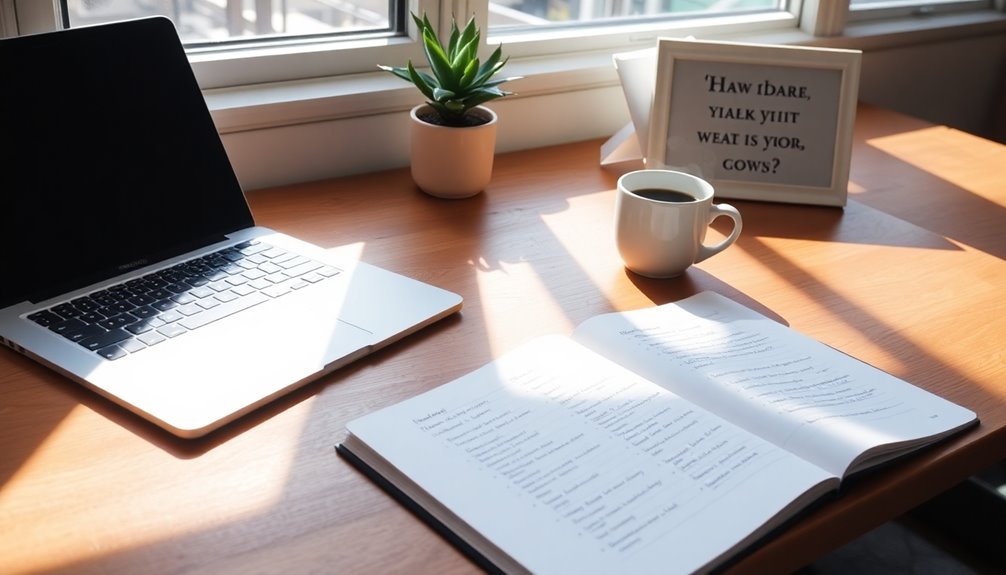
Crafting thoughtful questions is an essential part of your interview preparation that can set you apart from other candidates. By preparing at least five insightful questions, you demonstrate your genuine interest in the role and the organization. Focus on topics that aren't easily found on the company website to engage the interviewer effectively.
Consider asking about:
- Company culture: What values drive your team?
- Job responsibilities: Can you clarify the main objectives for this role?
- Recent projects: What challenges did the team face in the last project?
Inquire about team dynamics and growth opportunities within the organization to gauge how you'd fit into the workplace. By asking clarifying questions about performance expectations, you'll gain a better understanding of what success looks like in the role.
Additionally, you might want to explore how the company leverages data-driven marketing to enhance its brand visibility and customer engagement.
Thoughtful questions not only reflect your critical thinking skills but also showcase your proactive approach to the interview process. This can help you create a meaningful dialogue with the interviewer, making you a memorable candidate. So, take the time to prepare these questions, and you'll leave a lasting impression.
Practice Mock Interviews
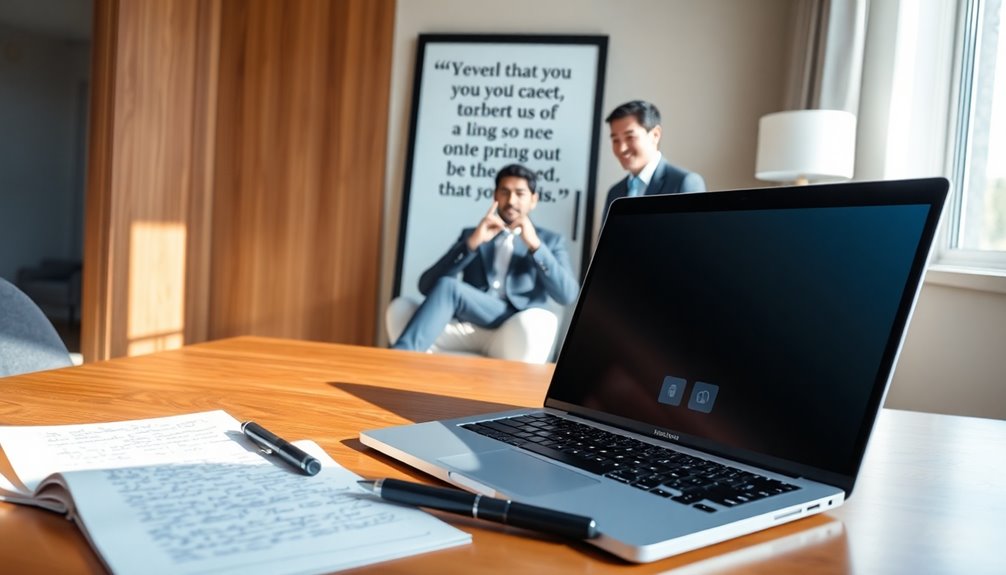
Practicing mock interviews is a powerful way to enhance your readiness for the real thing. Engaging in these sessions allows you to articulate your experiences and responses to common questions, boosting your fluency and confidence. You can use a friend or mentor to conduct mock interviews, providing you with valuable real-time feedback on your body language, tone, and clarity of communication.
Recording your mock interviews can reveal areas for improvement, such as pacing and the effectiveness of your responses. This self-assessment helps you refine your performance before the actual interview. It's also essential to practice with a variety of interview formats, including both virtual and in-person scenarios. This preparation helps you adapt to different dynamics and greatly reduces anxiety.
Follow-Up Etiquette

After your interview, following up promptly is essential for leaving a positive impression. Sending a thank-you email within 24 hours shows your appreciation and reinforces your interest in the position. In your note, make sure to reiterate key discussion points, showcasing how your skills align with the role and the organization.
Here are some tips for effective follow-up communications:
- Be timely: Send your thank-you email or note within 24 hours to demonstrate your enthusiasm.
- Express appreciation: Thank the interviewer for their time and insights during the conversation.
- Reinforce your interest: Highlight aspects of the role that excite you and reiterate why you're a great fit.
While a handwritten note can leave a lasting impact, an email is perfectly acceptable as long as it's sent promptly. This effort not only clarifies any points discussed but also helps maintain a professional relationship with the interviewer. Remember, candidates who follow up effectively stand out, showcasing their professionalism and commitment to the opportunity. Don't miss this chance to leave a strong final impression!
Refine Your Elevator Pitch

A strong elevator pitch can set the tone for your interview, making it easier for interviewers to grasp your value right from the start. Your elevator pitch should be a concise 30-second summary that highlights your background, skills, and career aspirations. Tailor it to align with the specific role and organization, focusing on relevant experiences that demonstrate your fit.
Start by identifying your unique strengths and key achievements. Make certain to incorporate these elements into your pitch to differentiate yourself from other candidates. For instance, mention a specific project where you excelled or a skill that's particularly relevant to the position.
Once you've crafted your pitch, practice delivering it aloud. This will help you sound natural and engaging during the interview. Aim for a confident tone and maintain eye contact for a stronger connection with your interviewer.
Rehearse your elevator pitch in various settings to build comfort and adaptability. This guarantees you can adjust to different audiences or interview formats effectively. By refining your elevator pitch, you'll leave a memorable impression that clearly communicates your value.
Frequently Asked Questions
How to Conduct a Job Interview in 12 Steps?
To conduct a job interview effectively, start by creating a welcoming atmosphere. Use friendly body language and engage in light conversation to ease nerves. Clearly outline the interview structure and ask open-ended questions that let candidates share their experiences. Take detailed notes on their responses for later evaluation. Finally, wrap up by inviting them to ask questions, showing you're open and interested in their perspective on the role.
What Is the Star Method When Interviewing?
The STAR method is a powerful tool for structuring your answers during interviews. You start by outlining the Situation you faced, then clarify the Task you were responsible for. Next, you detail the Actions you took to tackle the task, showcasing your problem-solving skills. Finally, you wrap up with the Result of your actions, highlighting the impact you made. This method helps you present your experiences clearly and effectively, making a strong impression.
What Are the Five C's to Remember in an Interview?
Imagine walking into an interview room, your heart racing but your mind sharp. Remember the five C's: clarity, confidence, communication, connection, and curiosity. You'll articulate your thoughts clearly, showcasing your skills. Practice builds your confidence, while effective communication, like eye contact, creates rapport. As you listen, establish a genuine connection, and don't forget to ask insightful questions that reflect your curiosity about the company. This approach sets you apart from the competition.
What Is the Golden Rule in an Interview?
The golden rule in an interview is simple: treat your interviewers with respect and professionalism. You should mirror the courtesy you expect from them. This approach not only makes a positive impression but also fosters a respectful dialogue. Remember, preparation is key, so understand the role and company well. Active listening is essential too, as it shows you value their insights, making you a more engaging and appealing candidate throughout the process.
Conclusion
By following these 12 steps, you're not just prepping for a job interview; you're building a foundation for your career. Remember, just like a knight sharpening their sword before a duel, your preparation will give you the edge you need to stand out. Embrace the process, stay confident, and don't forget to follow up. With the right mindset and effort, you'll be ready to conquer any interview that comes your way. Good luck!
